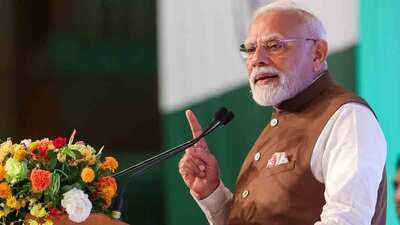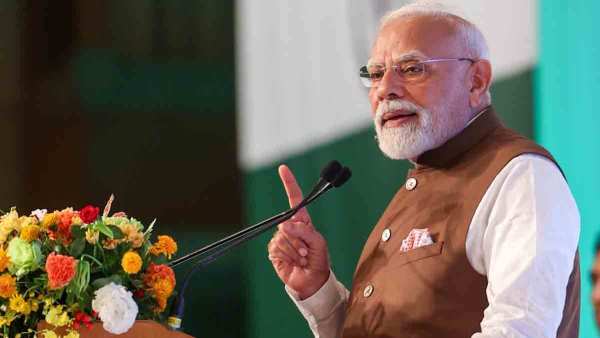

‘‘I urge all of you. Come, Make in India, Make for the World. The success stories of Suzuki and Daikin can become your success stories too,’’ the Prime Minister told Japanese businessmen and investors while narrating India’s growth story.
Describing India—Japan partnership as ‘strategic and smart’, powered by economic logic, he said shared interests have been converted into shared prosperity. ‘‘India is the springboard for Japanese businesses to the Global South. Together, we will shape the Asian Century for stability, growth, and prosperity.’’
Addressing the India-Japan Economic Forum after his arrival on a two-day official visit to Japan he said Japan has always been a key partner in India’s growth journey. Whether it’s metros, manufacturing, semiconductors, or start-ups, India-Japan partnership in every area reflects mutual trust.
He said Japanese companies have invested more than 40 billion US Dollars in India. In the last two years alone, there has been private investment of 13 billion US Dollars. JBIC says India is the most 'promising' destination. JETRO says 80 percent of companies want to expand in India, and 75 percent are already profitable.
‘‘Which means, in India, capital does not just grow, it multiplies!’’ he said.
Referring to the changes India has experienced in the last eleven years, the Prime Minister said India now has political and economic stability, and clear and predictable policies.
India is now the fastest-growing major economy in the world, and very soon, it will become the world’s third-largest economy, the Prime Minister added.
About India’s growth trajectory he said India is contributing to 18 percent of global growth. India’s capital markets are giving good returns and has a strong banking sector. Inflation and interest rates are low, and foreign exchange reserves stand at around 700 billion US Dollars.
‘‘Behind this change is our approach of Reform, Perform, and Transform,’’ he said adding that in 2017, India introduced ‘One Nation–One Tax’, and now work is on on bringing in new and bigger reforms in it. A few weeks ago, our Parliament has also approved the new and simplified Income Tax code.
Prime Minister Modi said the reforms are not limited to the tax system alone. There has been emphasis on ease of doing business. A single digital window approval for businesses has been established. A high-level committee on de-regulation has been formed to speed up this process.
He said sensitive sectors like Defence and Space have been opened up to the private sector and now nuclear sector is also being opened up.
These reforms reflect Government’s determination to build a developed India. ‘‘We have the commitment, the conviction, and the strategy, and the world has not just recognized it but also appreciated it. S&P Global has upgraded India's credit rating after two decades.
‘‘The world is not just watching India, it is counting on India,’’ the Prime Minister said.
Referring to the India-Japan Business Forum report detailing the business deals between companies, he suggested replicating the success of partnership in auto sector to other fields.
‘‘Our partnership in the auto sector has been extremely successful. Together, we can replicate the same magic in batteries, robotics, semi-conductors, ship-building and nuclear energy. Together, we can make a significant contribution to the development of the Global South, especially Africa.’’
In technology and innovation, Japan is a "Tech Powerhouse" and India a "Talent Powerhouse". India has taken bold and ambitious initiatives in AI, Semiconductors, Quantum computing, Biotech, and Space. Japan's technology and India's talent together can lead the tech revolution of this century.
In the Green Energy Transition. Prime Minister Modi said India is quickly moving towards 500 GW of renewable energy by 2030. ‘‘We also aim for 100 GW of nuclear power by 2047. From solar cells to green hydrogen, there are huge opportunities for partnership.’’
An agreement has been reached between India and Japan on Joint Credit Mechanism. This can be used to cooperate in building a clean and green future, he added.
In the last decade India has made unprecedented progress in next generation mobility and logistics infrastructure. The capacity of our ports has doubled. There are more than 160 airports. Metro lines of a 1000 km have been built. Work is also underway on the Mumbai-Ahmedabad high-speed rail in cooperation with Japan.
But our journey does not stop here. Japan's excellence and India's scale can create a perfect partnership.
In Skill Development and People-to-People Ties, he said the talent of India's skilled youth has the potential to meet global needs. Japan can also benefit from this. Japan could train Indian talent in Japanese language and soft skills, and together create a "Japan-ready" workforce. A shared workforce will lead to shared prosperity.
Earlier Prime Minister Modi arrived in Tokyo on a two-day visit to Japan. He will also attend the 15th India-Japan Annual Summit.